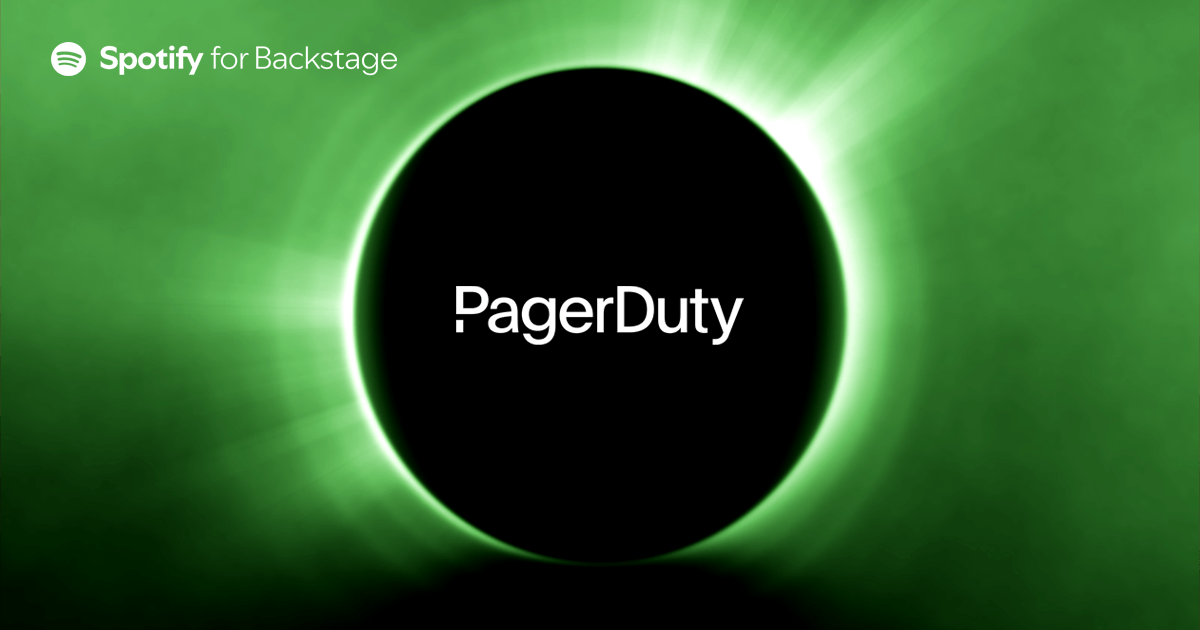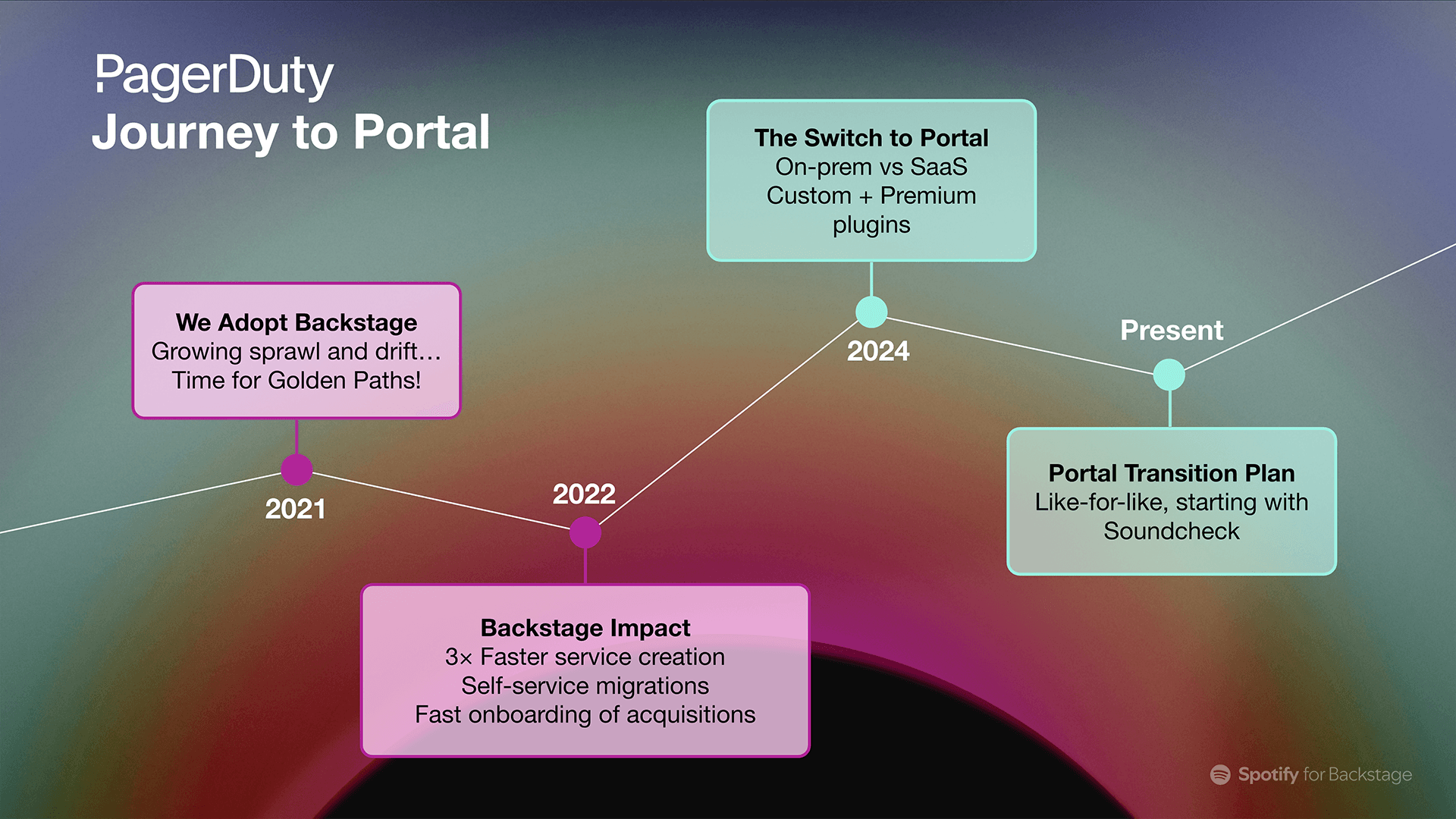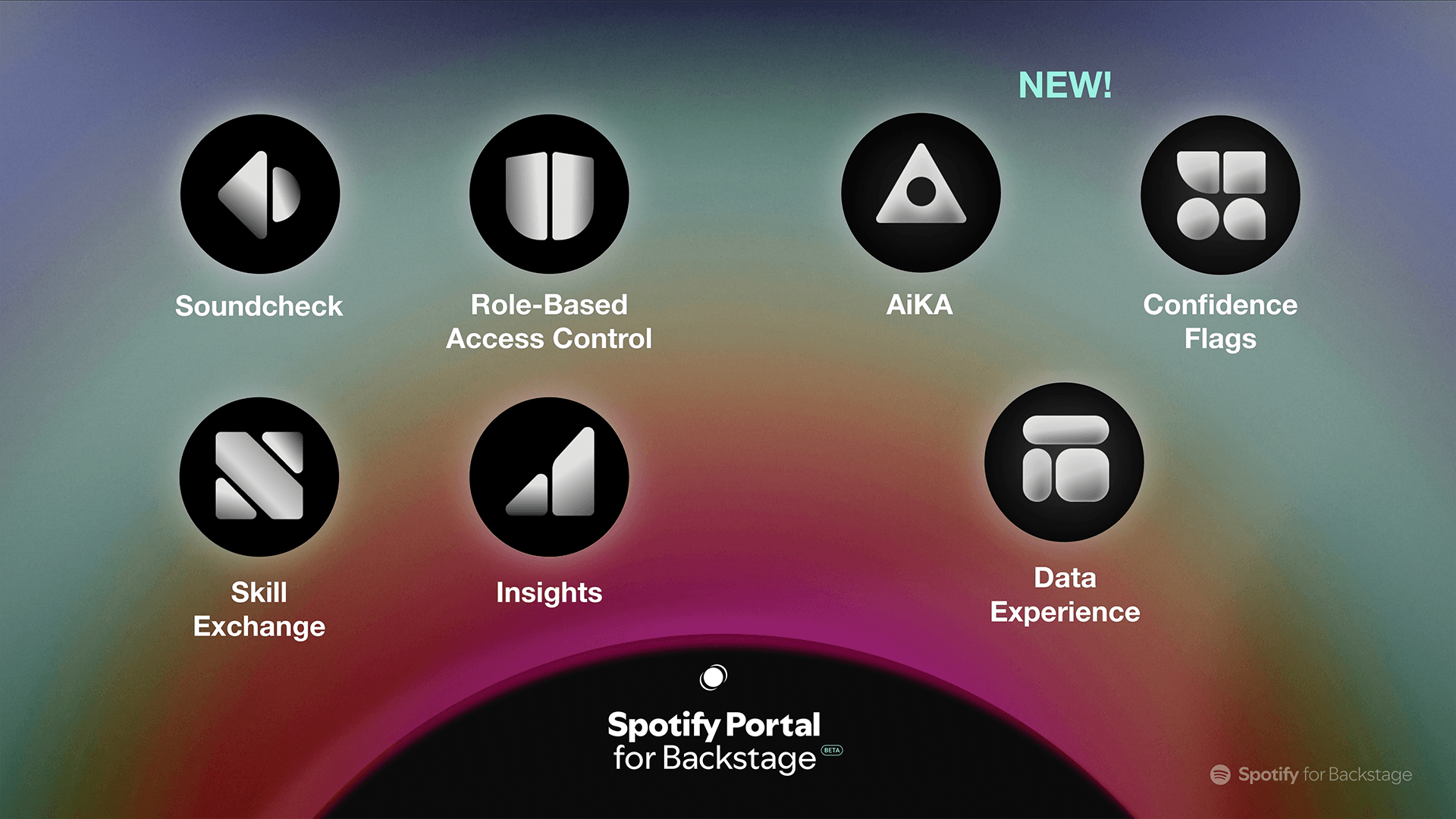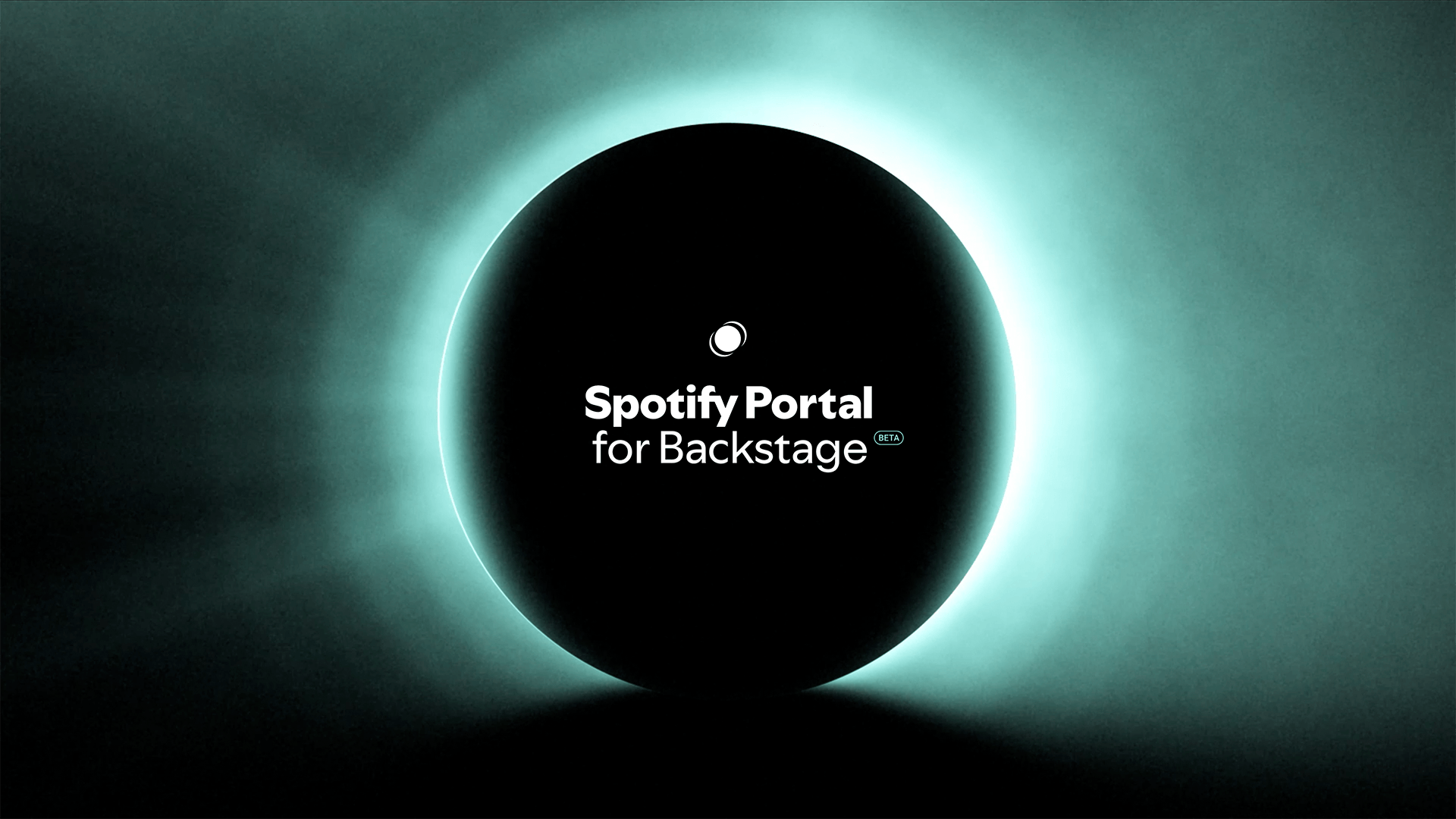PagerDuty makes the switch to Spotify Portal
- Author
- Spotify
- Published

As we’ve developed Spotify Portal, we’ve been working closely with the team at PagerDuty, and it’s been amazing to build with people who share the same commitment to developer experience. So we were thrilled to welcome Dave Bresci, senior manager for site reliability engineering and developer experience, to our webinar to talk about PagerDuty’s IDP journey and why they made the switch from running their own Backstage instance to becoming a Spotify Portal customer.
About PagerDuty
| Operations management platform |
|---|
| Founded: 2009, San Francisco |
User base:
|
| Company size: 1,240+ US and international employees |
| Backstage plugins: Software Catalog, Software Templates (Scaffolder), TechDocs, Search, Soundcheck, PagerDuty (natch), Announcements, Confluence, Events, Explore, GitHub Pull Requests |
Watch: PagerDuty’s customer journey
📺 Watch our conversation with PagerDuty’s Dave Bresci (approx. 10 mins., starting at 40:04)
During the webinar, Dave talked with Thang Nguyen, Spotify’s global head of sales for Backstage, about why PagerDuty adopted an internal developer portal (IDP) in the first place and the impact it’s had on speeding up onboarding and streamlining development.
Dave also explained why switching to Spotify’s managed solution for Backstage wasn’t just about reducing the maintenance load for his “small but mighty” developer experience team. It was also about unlocking more value in their IDP through the premium plugins that automatically come free with Spotify Portal — from Soundcheck (Spotify’s scorecard solution for tech health) to AiKA (an internal AI chatbot that knows everything your org knows).
Read on for more highlights from Dave and Thang’s discussion.
Beyond incident management
You likely know PagerDuty as the industry leader in incident management — maybe even just hearing their name has you sitting up a little straighter, your mind a little more attentive as you switch into troubleshooting mode — but as Dave points out, they’ve evolved into much more. Trusted by over 31,000 organizations globally, PagerDuty is transforming digital operations with an AI-driven “platform for action” that creates efficiency, builds resilience, and drives growth for their customers.
While innovating on their platform, they’ve added AI-driven insights, advanced automations, Slack and Teams integrations, post-incident learnings, and more. But all of that additional capability — over 700 integrations in all — brings its own complexity, and with it, a growing need to streamline and centralize the developer experience. As Dave put it, “With all the extra features that we've added into our platform the last few years, we've also dramatically increased our complexity.”
By this point, PagerDuty had already been running a Backstage instance, with measurable results on developer productivity. But to handle the rising sophistication and complexity of the PagerDuty platform, Dave’s team began thinking about how they could evolve their IDP and use it to scale their platform engineering efforts even further.
From Backstage to Portal

PagerDuty’s IDP journey started back in 2021 — with a somewhat impromptu adoption of the Backstage open source framework that quickly proved its value
Adoption: Tackling sprawl and drift (with a hack)
“It was just so wildly successful”
The PagerDuty team started experimenting with Backstage four years ago during a company hack week to see if it could help with the growing sprawl and drift they were seeing in their internal services. “Most people were creating new services just by copy-pasting a skeleton repo,” Dave said. Eventually, how services were built started to “drift wildly” from each other.
So, as part of the hack week project, one of their engineers, Mark Shaw, used the Backstage Scaffolder to build PagerDuty’s first Golden Path: a backend skeleton for new services.
Now anyone could create a service backend by using a Software Template in Backstage. Just fill out a form and you’d get a fresh new service built according to all the latest internal tech standards. It wasn’t just a way for PagerDuty’s developers to build things the right way — it was also the easiest way.
“Because we have Backstage and we have the Golden Path available, they all would create sample services right away. They'd get a service out that they could play with using our tech stack within a day,” Dave said. “It was just so wildly successful that we felt like we had officially adopted Backstage.”
Impact: Turning happiness into productivity
“We weren't expecting it to be this easy”
After that 2021 hack week, Dave’s team quickly began to expand on their Backstage instance — adding a frontend template to go with the backend one, and adopting TechDocs as a centralized solution for technical documentation. They were on their way to establishing Backstage as the go-to engineering hub, the “single pane of glass” for their developers.
As their Backstage IDP continued to take shape, the benefits became increasingly clear. Their work making the lives of their developers easier — from spinning up a new service, to sharing and discovering internal knowledge — started to pay off.
Looking back a year later, the team could see improvements on developer productivity across PagerDuty, including:
-
3× Faster service creation: The median time to create a new service went from 75 hours to just 25.
-
Self-service migrations: Developers were able to perform migrations independently — even large migrations like the move to Kubernetes — using well-documented Golden Paths. Noting the developer response, Dave said, “A couple of the folks would reach out and say, ‘Hey, we weren't expecting it to be this easy.’”
-
Fast onboarding of acquisitions: As PagerDuty acquired new companies — including new tech stacks and new team members — they were able to self-serve onboarding to the PagerDuty way of doing things through Backstage.
The results were meaningful and measurable. PagerDuty’s small-but-mighty developer experience team had been able to leverage Backstage’s core features to create a real impact across the org. But as their internal instance matured, they also started to feel like they could be getting more out of their IDP.
The switch to Portal
“It was almost a no-brainer”
PagerDuty’s Backstage instance had gone from a hack project to full-fledged IDP in a short time, but developing it beyond the core services was slowing down. “Whenever we'd get to work on Backstage, it was more to keep up with the maintenance,” Dave said. “I was always on the lookout for outsourcing that” in order to allow his small team to focus more on adding new features and capabilities for their devs.
More than SaaS
So when Spotify Portal arrived, it seemed like just the thing he had been looking for — a SaaS solution for Backstage, built by its original creators. PagerDuty signed up to explore the Portal beta and began working closely with our platform engineering team as one of Spotify’s Design Partners. That’s when it started to become clear to Dave that reducing the maintenance burden on his team was only part of what Spotify and Portal had to offer.
Extensible and opinionated: The best of all worlds
The power of Portal comes from how it combines Spotify’s deep IDP experience and expertise with the flexibility of open source and the simplicity of SaaS — providing the best of all worlds.
Being able to customize and extend your IDP to fit how your org works is why most companies choose Backstage. By switching to Portal, PagerDuty could leave app updates and other maintenance responsibilities to Spotify, while continuing to take advantage of community and custom-built plugins.
On top of that, Spotify’s platform engineering expertise comes bundled with Portal, as well — from how it’s designed to be easy to use for engineers and non-engineers alike, to the proven Spotify plugins that come with it.
Come for the plugins, get an IDP for free

Premium features, lower maintenance, and Spotify expertise are all built right into Portal
The bundled value of Portal made the decision to switch easy for Dave. As he recounted to Thang, “To be honest, when you came to me with that and you said, ‘Oh, also it includes all these premium plugins, plus you'll be able to test some of the early access to new features’ — that was actually an easier business case for me to make. It was almost a no-brainer.”
All of Spotify’s premium plugins are included with Portal for free, including:
- Soundcheck: Our scorecard plugin for improving tech health at scale.
- RBAC: Powerful, simple role-based access control.
- Skill Exchange: An internal marketplace for learning, growing, and hacking.
- Insights: Drive internal adoption of your IDP with key usage and sentiment data
Plus, Portal users also get early access to Spotify’s latest plugins, including:
- AiKA: The RAG-based AI knowledge assistant that knows everything your org knows.
- Data Experience: Manage datasets in Portal just like you manage software components.
- Confidence Flags: Manage feature flags for A/B testing and rolling out features in your products.
…with the Spotify team shipping more updates, improvements, and new features to your Portal instance every month.
Of particular interest to PagerDuty is the potential impact of having an AI chatbot integrated right inside their IDP. “AiKA actually solves a real use case that we've gotten feedback from developers directly in our developer surveys for years, which is documentation sprawl, documentation discoverability, and the ability to find answers quickly,” Dave said. “We were actually looking for our own solution to this before we even knew that you were going to bring this to Portal.”
The transition plan
Portal includes onboarding wizards and setup guides to help orgs get up and running with their new IDP on day one. Integrations with source control providers, like GitHub, GitLab, and Azure DevOps, make it easy to populate the Software Catalog. Starter templates in Soundcheck simplify setting up health checks, and step-by-step guides for Scaffolder help automate the creation of new services.
Since PagerDuty was already running a mature Backstage instance, their transition plan is different from a new adopter’s. A few teams have already started working in their new Portal instance. The security team is using Soundcheck to track vulnerabilities, and the frontend team is using it to monitor critical dependencies. The strategy is to roll out the new features and plugins of Portal to the rest of PagerDuty’s teams gradually, paired with a developer survey to gather feedback and prioritize future improvements.
“We listen to our developers, that's one of the key things,” Dave says. “The fact that we don't have to maintain Portal ourselves will actually give us more time to be able to build those features into the IDP that [our developers] want.”
What’s next for Spotify and PagerDuty
Having worked closely with PagerDuty as they trialed Portal, we’re not just handing over a product — we’re building a partnership. As Dave said to Thang, “We were pretty excited to work on this with you. My goal now is just to be able to take more advantage of the features we find in Portal and bring them to our developers.” Topping PagerDuty’s to-do list:
-
Reducing cognitive load: Focusing on Portal’s impact on developer experience, especially for reducing cognitive load, improving feedback loops, and maintaining flow state.
-
Reliability and security: Promoting ownership, increasing visibility of services and architecture, and continuing the work being done by the security team using Soundcheck to track vulnerabilities and critical dependencies.
-
Building together: Envisioning innovative ways the PagerDuty platform can integrate with Portal, including leveraging operational data, dependency graphs, and automation.
“Portal actually gives us the time and space to push for that single pane of glass,” Dave said at the end of his conversation with Thang. “We'll be able to build more and bring more features and developer productivity tools to our core developer customer base.”
Watch the whole conversation for more insights from Dave Bresci and to hear more about the incredible work his team has done with Backstage at PagerDuty.
Ready to 2× your productivity? Get Portal today

Want to build like Spotify? Get started with free access to Spotify Portal:
-
🚀 First 5 weeks free. Get up and running fast with our hosted, extensible version of Backstage.
-
💡 Guidance from Spotify engineers. Learn from the team who built it — and help shape what’s next.
-
✨ Early access to new plugins. Get new features and updates shipped right to your Portal instance.
For more stories, insights, and product updates, follow Spotify for Backstage on LinkedIn.